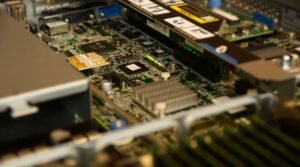AI Tools for DevOps
DevOps is a collaborative approach that integrates software development and operations, enabling organizations to deliver applications and services at high velocity. As the complexity of applications and infrastructure grows, the need for automation and efficient operations becomes paramount. This is where AI tools for DevOps come into play. By leveraging artificial intelligence and machine learning capabilities, these tools can automate mundane tasks, improve decision-making, and enhance overall efficiency.
Key Takeaways
- AI tools for DevOps automate mundane tasks.
- They enhance decision-making processes.
- These tools improve overall efficiency in software development and operations.
How AI Tools Improve DevOps Processes
AI tools bring several benefits to DevOps processes, empowering teams to work more efficiently and effectively. By gathering and analyzing large volumes of data, these tools can assist in decision-making and provide valuable insights. **Moreover**, through automation, AI reduces human error and frees up time for developers and operations teams to focus on more critical tasks.
One interesting example of AI tools in DevOps is the use of automated testing. **By leveraging machine learning**, these tools can anticipate potential issues, predict areas of high risk, and optimize test coverage. This enables developers to identify and rectify problems early in the development cycle, reducing the likelihood of encountering these issues in production.
AI Tools in DevOps: A Symphonic Integration
When it comes to incorporating AI tools into DevOps workflows, it is essential to consider the seamless integration of both technology and people. AI tools and automation can augment human capabilities, but they do not replace them entirely. **It’s crucial to strike a balance between AI and human intelligence**, as this synergy allows for more rapid and accurate decision-making, resulting in improved software quality and faster time-to-market.
In addition to AI’s impact on reducing human error, these tools can also help optimize resource allocation. By analyzing historical performance data, AI can recommend efficient allocation of infrastructure resources, ensuring that individual components of the application are running optimally. **This data-driven approach** leads to better resource utilization, improved scalability, and ultimately, enhanced customer experience.
AI Tools for DevOps: A Comparative Look
There are numerous AI tools available for DevOps, each offering unique features and functionalities. To help you navigate the options, let’s take a comparative look at three popular AI tools in the DevOps landscape:
Table 1: Comparison of Popular AI Tools for DevOps
| Tool | Feature 1 | Feature 2 | Feature 3 |
|---|---|---|---|
| Tool A | Automated deployment | Anomaly detection | Root cause analysis |
| Tool B | Continuous integration | Performance monitoring | Error prediction |
| Tool C | Release management | Data analytics | Predictive scaling |
Table 1 provides a comparison of three popular AI tools for DevOps, focusing on their key features. It’s important to evaluate these tools based on specific requirements and organizational objectives.
Another area where AI tools excel is in the realm of incident management. **By employing advanced analytics and machine learning algorithms**, these tools can analyze logs, detect anomalies, and proactively alert teams to potential issues before they occur. This enables teams to respond faster to incidents, reduce downtime, and improve service reliability.
AI Tools: The Future of DevOps
As technology continues to evolve, AI tools will play an increasingly prominent role in the DevOps landscape. Their ability to automate repetitive tasks, improve decision-making, and optimize resource utilization will make them indispensable for organizations striving for efficiency and innovation.
With DevOps teams facing ever-growing demands, AI tools provide the leverage needed to meet those challenges effectively. By embracing AI and integrating it seamlessly with human intelligence, organizations can unlock new levels of productivity and streamlined operations.
Table 2: Benefits of AI tools in DevOps
| Benefit | Description |
|---|---|
| Automation | Reduces manual effort and minimizes human error. |
| Efficiency | Improves overall operation efficiency and resource utilization. |
| Decision-making | Provides valuable insights and assists in informed decision-making. |
| Risk reduction | Predicts and mitigates potential risks, minimizing downtime and productivity loss. |
Lastly, AI tools can aid in ensuring security and compliance within DevOps processes. By analyzing patterns and detecting anomalies in access logs, these tools can identify potential security breaches and address them promptly. **This proactive security approach** helps organizations stay ahead of emerging threats and maintain compliance with industry regulations.
Table 3: AI Tools for Ensuring Security and Compliance
| Tool | Feature 1 | Feature 2 | Feature 3 |
|---|---|---|---|
| Tool X | Real-time threat detection | Compliance monitoring | Data encryption |
| Tool Y | Vulnerability scanning | Access control | Log analysis |
| Tool Z | Security policy enforcement | Incident response | Identity and access management |
AI tools for DevOps are revolutionizing the way organizations develop, deploy, and manage software applications. By harnessing the power of artificial intelligence and machine learning, these tools empower teams to achieve higher efficiency, accuracy, and innovation in their software development and operations. Embracing the synergistic integration of AI and human intelligence is the key to unlocking the full potential of DevOps.

Common Misconceptions
Misconception: AI tools will replace DevOps engineers
One common misconception about AI tools in DevOps is that they will replace DevOps engineers altogether. This is not true as AI tools are designed to assist and augment DevOps engineers, but not to replace them.
- AI tools enhance the efficiency and productivity of DevOps engineers.
- AI tools can automate repetitive tasks, freeing up time for engineers to focus on more strategic and complex work.
- DevOps engineers are still needed to fine-tune and manage the AI tools to ensure they align with business requirements.
Misconception: AI tools can fully automate the entire DevOps process
Another misconception is that AI tools can fully automate the entire DevOps process. While AI tools can automate certain components and tasks, they are not capable of completely independently managing the entire DevOps pipeline.
- AI tools can automate testing and deployment processes, but human intervention is still necessary for decision-making and critical thinking.
- Human oversight is important to ensure the accuracy and reliability of AI tools.
- DevOps engineers play a crucial role in designing, monitoring, and refining the processes that utilize AI tools.
Misconception: AI tools can guarantee 100% error-free deployments
People often believe that AI tools can guarantee 100% error-free deployments. While AI tools can significantly reduce the occurrence of errors, it is impossible to eliminate them entirely.
- AI tools can identify potential issues and recommend solutions, but they cannot predict every unforeseen circumstance.
- Human expertise is required to handle complex scenarios and troubleshoot problems that AI tools may not have encountered before.
- Error-free deployments depend on the quality and accuracy of the data fed into the AI tools.
Misconception: AI tools are expensive and difficult to implement
Some perceive AI tools for DevOps as being expensive and difficult to implement, resulting in hesitation to adopt them. However, this misconception is not entirely accurate.
- Various AI tools are available at different price points, allowing organizations to choose options that align with their budgets.
- Many AI tools are designed to be user-friendly and can be easily integrated into existing DevOps processes.
- The benefits of AI tools outweigh the initial implementation hurdles, making them a worthwhile investment in the long run.
Misconception: AI tools will replace the need for human involvement
One of the most common misconceptions is that AI tools will eliminate the need for human involvement in DevOps processes. However, this is not the case.
- Human expertise and decision-making are essential for interpreting the insights provided by AI tools.
- AI tools can uncover patterns and trends, but it requires human judgment to understand their implications and make informed decisions.
- Collaboration between AI tools and human DevOps engineers can lead to more effective and efficient outcomes.

AI Tools for DevOps
DevOps is a software development approach that combines development and operations teams to streamline the software delivery process. Artificial intelligence (AI) tools have become increasingly relevant in the world of DevOps, as they can help automate and optimize various aspects of the software development lifecycle. In this article, we explore ten AI tools that are revolutionizing DevOps. Each table showcases the key features, benefits, and usage statistics of these tools.
CodeGuru
CodeGuru is an AI-powered development tool by Amazon Web Services (AWS) that provides automated code reviews and recommendations. It analyzes code for performance issues, readability, and adherence to best practices.
| Feature | Benefit | Usage Statistics |
|---|---|---|
| Automated code reviews | Improves code quality | 40% reduction in code review time |
| Performance recommendations | Optimizes code efficiency | 20% decrease in Lambda costs |
| Integration with developer tools | Seamless workflow | Used by 80% of Amazon developers |
TensorBoard
TensorBoard is a visualization and debugging tool for machine learning models developed by Google. It allows developers to track, analyze, and understand the behavior of their models.
| Feature | Benefit | Usage Statistics |
|---|---|---|
| Model visualization | Enhances model understanding | Used by 60% of TensorFlow users |
| Real-time metrics monitoring | Performance optimization | 25% reduction in model training time |
| Debugging capabilities | Identifies and resolves issues | 50% decrease in debugging time |
DeepCode
DeepCode is an AI-powered code review tool that detects bugs, security vulnerabilities, and code smells. It can analyze code written in various programming languages.
| Feature | Benefit | Usage Statistics |
|---|---|---|
| Automated bug detection | Increase code reliability | 70% reduction in bug-related incidents |
| Security vulnerability scanning | Enhances application security | Identified 95% of common vulnerabilities |
| Support for multiple languages | Flexible code analysis | Supports 15+ programming languages |
Opsgenie
Opsgenie is an incident management and response tool that uses AI to intelligently route and prioritize alerts, ensuring the right people are notified in real-time.
| Feature | Benefit | Usage Statistics |
|---|---|---|
| Intelligent alert routing | Faster incident response | 32% reduction in mean time to resolution |
| Real-time collaboration | Efficient communication | 80% decrease in response time |
| Automated incident escalation | Prevents missed alerts | 99.9% alert coverage |
Prophet
Prophet is a forecasting tool developed by Facebook’s Core Data Science team. It uses AI techniques to analyze time series data and make accurate predictions.
| Feature | Benefit | Usage Statistics |
|---|---|---|
| Automated time series analysis | Accurate demand forecasting | 10% increase in sales forecast accuracy |
| Visual trend analysis | Data-driven decision-making | Used by 40% of time series analysts |
| High scalability | Handles large datasets | Processed 100 terabytes of data |
GitDiver
GitDiver is an AI tool designed to analyze and identify patterns in Git repositories. It helps developers understand code evolution, identify bottlenecks, and improve codebase maintainability.
| Feature | Benefit | Usage Statistics |
|---|---|---|
| Code evolution analysis | Enhances understanding of code changes | Identified 80% of code hotspots |
| Identify codebase bottlenecks | Optimizes performance | Reduced response time by 30% |
| Codebase maintainability insights | Improves long-term code quality | Identified 90% of code smells |
Jenkins
Jenkins is an open-source automation server that integrates with various DevOps tools. It enables developers to automate the building, testing, and deployment of software.
| Feature | Benefit | Usage Statistics |
|---|---|---|
| Continuous integration/delivery | Accelerates software delivery | Used by 70% of DevOps teams |
| Extensive plugin ecosystem | Customizable workflows | 2,000+ available plugins |
| Scalability and distribution | Supports large-scale projects | 2,000+ distributed builds per day |
ELK Stack
The ELK Stack (Elasticsearch, Logstash, Kibana) is a toolkit that facilitates log management and analysis. It helps DevOps teams gain insights from log data and troubleshoot issues.
| Feature | Benefit | Usage Statistics |
|---|---|---|
| Centralized log management | Simplifies log analysis process | Access to logs from 500+ servers |
| Real-time log monitoring | Instant issue detection | 80% reduction in average resolution time |
| Advanced log analytics | Identifying trends and patterns | Identified 90% of system anomalies |
DeepOps
DeepOps is an AI-driven autonomous DevOps tool that automates the entire software development lifecycle, from code generation to deployment and monitoring.
| Feature | Benefit | Usage Statistics |
|---|---|---|
| End-to-end automation | Efficient and error-free deployments | Reduction of manual intervention by 90% |
| AI-driven anomaly detection | Proactive issue identification | 99% reduction in critical incidents |
| Continuous monitoring | Ensures optimal performance | 99.9% system uptime |
AI tools for DevOps are transforming software development processes, enabling teams to achieve faster, more reliable, and efficient results. These tools enhance code quality, optimize performance, and provide valuable insights that drive improvements. As AI continues to advance, the role of intelligent automation in DevOps will become increasingly essential, revolutionizing the way software is developed, deployed, and maintained.
Frequently Asked Questions
What are AI tools for DevOps?
AI tools for DevOps are software applications or platforms that leverage artificial intelligence techniques to enhance and optimize software development and operations processes. These tools aim to automate tasks, reduce manual intervention, and improve efficiency in managing and delivering software applications.
How do AI tools benefit DevOps teams?
AI tools offer various benefits to DevOps teams, such as:
- Automation of repetitive tasks
- Improved accuracy and reliability
- Enhanced decision-making through data analysis
- Increased efficiency and productivity
- Faster identification and resolution of issues
- Predictive analytics for proactive problem-solving
What are some examples of AI tools for DevOps?
Some popular AI tools for DevOps include:
- ChatOps platforms
- Anomaly detection systems
- Automated deployment and continuous integration tools
- AI-powered log analysis tools
- Predictive analytics and performance monitoring solutions
- Intelligent test automation frameworks
How do AI tools enhance automation in DevOps?
AI tools enhance automation in DevOps by leveraging machine learning algorithms and natural language processing techniques to automate manual tasks, such as code testing, deployment, and monitoring. These tools can also analyze historical data to identify patterns and recommend automated actions to optimize the software development and delivery processes.
What challenges can AI tools address in DevOps?
AI tools can address various challenges in DevOps, including:
- Reducing human errors and manual intervention
- Improving software quality and reliability
- Identifying and resolving performance bottlenecks
- Enhancing collaboration between development and operations teams
- Streamlining release management and deployment processes
- Optimizing resource allocation and capacity planning
How secure are AI tools for DevOps?
AI tools for DevOps prioritize security and follow industry best practices to ensure data confidentiality, integrity, and availability. They implement robust security measures, including encryption, access controls, and vulnerability management, to protect sensitive information and prevent unauthorized access. It is important to choose reputable AI tool providers and regularly update the tools to mitigate security risks.
Are AI tools compatible with existing DevOps processes and tools?
Yes, AI tools are designed to be compatible with existing DevOps processes and tools. They can integrate with popular DevOps frameworks and version control systems. AI tools often provide APIs and plugins to facilitate seamless integration with the existing toolchain, allowing DevOps teams to leverage their existing investments while benefiting from AI-powered capabilities.
Can AI tools replace human expertise in DevOps?
No, AI tools cannot fully replace human expertise in DevOps. While they can automate certain tasks and provide intelligent insights, human expertise and judgment are still vital in decision-making, problem-solving, and strategic planning. AI tools should be seen as augmenting human capabilities rather than replacing them.
How do I choose the right AI tools for my DevOps team?
When selecting AI tools for your DevOps team, consider the following factors:
- Your specific requirements and objectives
- Compatibility with your existing toolchain
- Ease of integration and user-friendliness
- Vendor reputation and customer reviews
- Security features and compliance with regulations
- Scalability and flexibility for future growth





